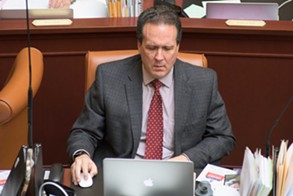Support the Free Press | Facts matter. Truth matters. Journalism matters
Salt Lake City Weekly has been Utah's source of independent news and in-depth journalism since 1984. Donate today to ensure the legacy continues.
Buzz Blog
Keeping Track of Vote-Influencers
Bill raises concerns that political groups could hide influence from voters.


One lawmaker wants to define more clearly the rules for groups trying to influence your vote. The move has Utah’s elections chiefs worried it could open the door to political dark money groups influencing elections without your knowledge.
House Bill 425, sponsored by Rep. Brad Daw, R-Orem, would change the definition of how far any organization can go to influence an election before it is required to disclose its involvement and its donors.
Under the current statute, a group has to report who it is and who its donors are if it acts “in a way to influence or tend to influence, directly or indirectly," any Utahn’s vote in favor or against a candidate or ballot question.
“The language is so vaguely written right now,” Daw told members of the House Government Operations Committee on March 1, “it could be constitutionally challenged” on the grounds that it violates free speech.

- Niki Chan Wiley
- Rep. Brad Daw, R-Orem.
Under Daw’s bill, groups would only need to disclose their donors if the group would “expressly advocate” for or against a candidate or ballot question.
Stan Rasmussen of the conservative Sutherland Institute spoke in favor of the bill, telling committee members that Sutherland feels Daw’s new language protects free speech but still ensures “fair and free” elections.
However, Mark Thomas, the director of elections in the Utah Lieutenant Governor’s Office, says that he’s concerned the new language could actually shield groups from public scrutiny even though they are trying to sway voters. “This would go too far,” Thomas told the committee, describing how organizations or groups could provide vehicles, office space, or other needs on behalf of a candidate or a political action committee that’s working on a ballot initiative, but because they are not “expressly advocating” for the issue, they would be shielded from disclosure requirements.
“These are very sensitive areas of the law," Thomas says. "I would caution everyone as we move forward on this ... I’m afraid that [an organization] could argue that ‘the major purpose of our organization isn’t the election,’ and that would allow an out for pretty much any entity,” Thomas said.
Connor Boyack, president of the conservative Libertas Institute, also testified, pointing out that his organization is challenging the statute's existing language in court on free speech constitutional grounds.
“However, this bill doesn’t actually address the underlying constitutional issues," Boyack told the committee, "Imagine if you would, the LDS Church—that does not have as a major purpose to engage in [election] issues, let’s say the medical marijuana bill goes to a ballot initiative and the church wants to oppose it and weighs in. If they spend more than … $750 in a single year [on the election], under this law that would trigger a reporting requirement that requires them to disclose the names and donation amount of every single one of their donors.”
The Lieutenant Governor’s Office’s concerns seemed to resonate with the committee. “I would like to hold the bill,” Rep. Fred Cox, R-West Valley City said. “I have some concerns with some of the language here, so if we can hold it I believe [Rep. Daw] is getting some feedback, and it may be something easy to fix, and I’m willing to look at it again after he’s done that.”
Rep. Patrice Arent, D-Salt Lake City, was sharper in her response, telling Rep. Daw “I don’t want to see this bill come back [to the committee] unless you’ve come to an agreement, because the concerns raised by the Lieutenant Governor’s Office are very, very serious.”
After the committee hearing, Daw told City Weekly, “I clearly need to make sure that we’re able to narrow the language without hamstringing the Lieutenant Governor’s Office.
The committee voted to hold the bill on Tuesday while Daw further consulted with the Lieutenant Governor's Office. It was scheduled to be heard again on March 3 but was pulled from the agenda at the last minute without explanation. With only a few days remaining in the 2016 legislative session, it's unclear whether or not the bill will be voted upon this session unless lawmakers vote on it from the floor without a public hearing.CW
In addition to covering state politics for City Weekly, Eric Ethington is communications director for Political Research Associates.